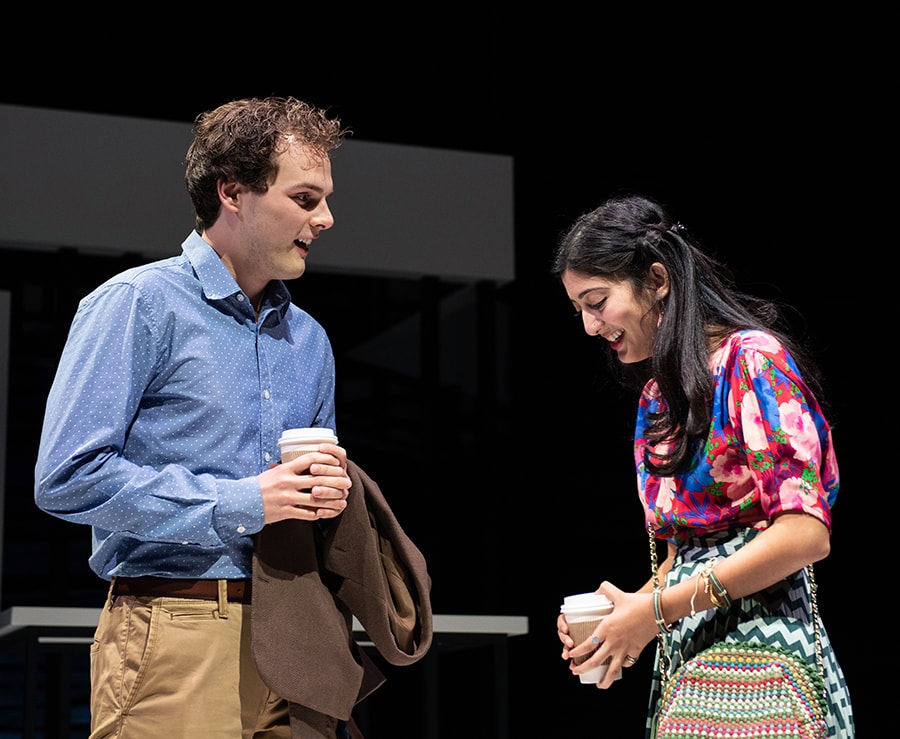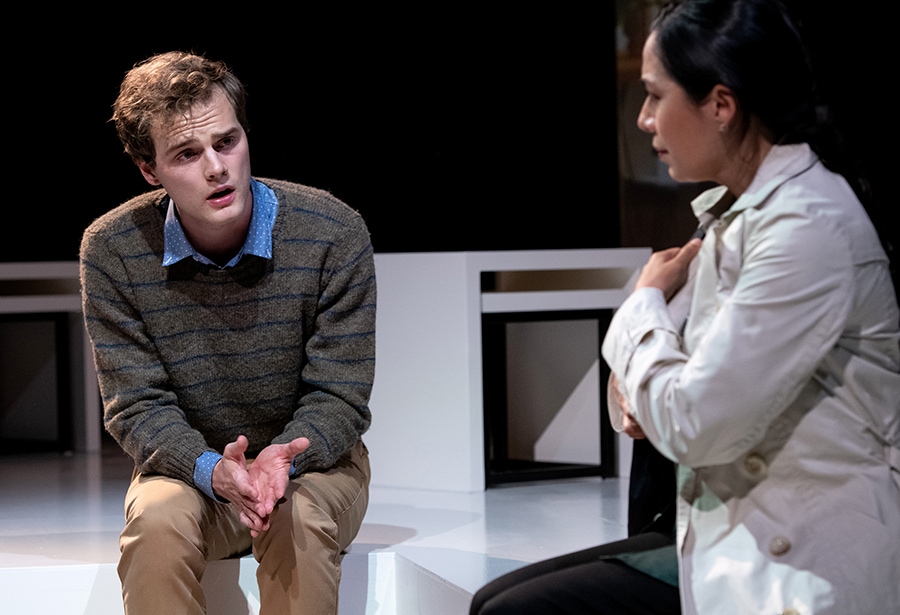How do you put a human face on a difficult, complex subject the natural habitat of which may more likely be a law review article than a stage? Such is playwright Sharyn Rothstein’s task in Right to be Forgotten, now playing its world premiere at Arena Stage.

The play’s title reflects a concept adopted in 2014 by the Court of Justice for the European Union (CJEU). Under the decision, individuals have the right, under some circumstances, to ask search engines like Google to remove links containing personal information about them. This right is not absolute. CJEU’s decision said that an individual’s request must be balanced with other considerations, such as freedom of expression, on a case-by-case basis.
Last month, the CJEU limited the scope of its 2014 ruling, saying that the “right to be forgotten” applied only to sites within the EU, rather than globally (e.g., Google.fr vs. Google.com). One of the reasons for the decision was the CJEU’s recognition that non-EU states do not necessarily recognize the right to de-reference information in the same way that the EU does. A prime example is the U.S., where the 1st Amendment is a significant obstacle to creating such a right. David Greene of the Electronic Frontier Foundation, one of the people acknowledged in Arena’s program, made this point well in a September 26 article about the decision. So do a number of characters in Rothstein’s play.
Rothstein’s vehicle for embodying the pain caused by long-lasting, negative web information is a nerdy, nervous, quirky, 27-year old graduate student in literature, Derril Lark (John Austin). Ten years before, as a clueless adolescent, he had for a few months stalked a fellow high school student, Eve Selinsky (Guadalupe Campos). The incident went viral, with extensive subsequent embellishment, blighting Derril’s employment and relationship prospects.
Derril, whose social skills remain somewhat suspect – anticipating rejection, he uses his quick wit to deflect others; he thinks of his ferret as an emotional support animal – wants to have the links to his past behavior stricken from the internet. He turns to a crusading lawyer, Marta Lee (Melody Butiu) to see if something can be done in court or politically to erase the material, pesky 1st amendment or no. She reaches out to a sympathetic, politically ambitious state attorney general, the smooth but calculating Alvaro Santos (Edward O’Blenis) for help. Her efforts are opposed by her former law school classmate, Annie Zahirovic (Rachel Felstein), now a corporate lobbyist for big tech firms.
A signal success of Rothstein’s writing, and the actors’ characterizations is that none that of these people come off as a hero or a villain. All have human failings; all have reasons for what they have done. Like the issue the play discusses, they live in a world of uncomfortable nuances. Each has betrayed others; each has been betrayed. Each stands in need of understanding and, perhaps, forgiveness. This dynamic plays out particularly between Derril and Eve. He seeks her forgiveness, for both personal and tactical reasons. She causes him to realize, perhaps for the first time, how badly she was frightened by his behavior. But she too, like other characters, has secrets, online exposure of which could do her great harm.

Marta and Annie are recognizable types: the lawyer so wedded to her cause that she is willing to act unethically and contrary to her client’s needs, to achieve her goals, and the hard-boiled lobbyist ruthlessly doing whatever is necessary to protect the interests of her clients. Butiu and Felstein have some crackling sharp confrontations, often attacking with a smile, though their frenemy relationship feels formulaic at times.
The one character who stands partly outside the fraught interactions among the others is Sarita Imari (Shubhangi Kuchibhotla), herself on the insecure and distinctly quirky side, who likes Derril but is discomfited by his online reputation. Drawn to Derril by his wit and his moments of emotional openness when reciting poetry by 20th-century Russian poet Osip Mandelstam (a victim of the Gulag), she comes more naturally to a kind of empathy which is a greater struggle for other characters.
Paige Hathaway’s set expresses a clean, minimalist Apple Store esthetic, all definitive black and white squares and rectangles, not a gray area or comforting curvilinear element in sight. Shawn Duan’s projections, not surprisingly in a play about the internet, feature fields of 0’s and 1’s, as well as headlines and text messages concerning the action. The costumes, designed by Ivana Stock, are well-calibrated to each character (e.g., posh, elegant outfits for Annie; a professional power suit for Santos; informal but colorful attire for Eve and Marta).
Seema Sueko’s direction not only maintains the pace of a complex ensemble piece but takes opportunities to feature the script’s substantial humor in the midst of a presentation centered on a serious, “ripped from the headlines,” topic. It is no easy job for the director and actors, in a play of ideas like Right to be Forgotten, to create characters who, in addition to standing in for various positions in an unresolved, ongoing debate, come across as credible individuals, whose changing relationships are clear to the audience. The team’s success in doing so is a credit to the production.
Running Time: 85 minutes with no intermission.
Right to Be Forgotten plays through November 10, 2019, in the Kogod Cradle at Arena Stage, 1101 Sixth Street SW, Washington, DC. For tickets, call 202-488-3300 or go online.




